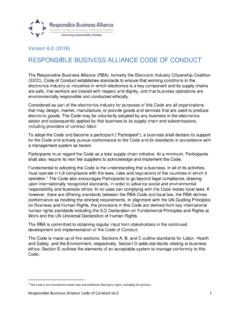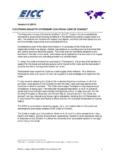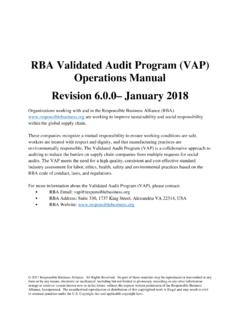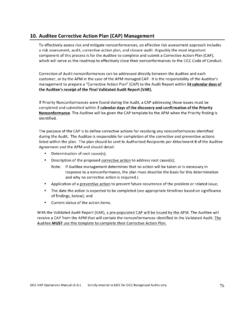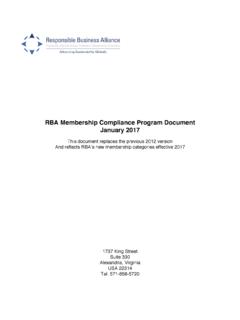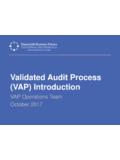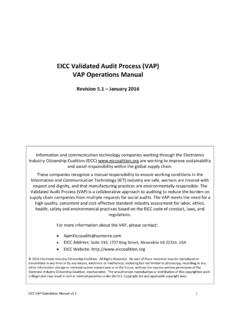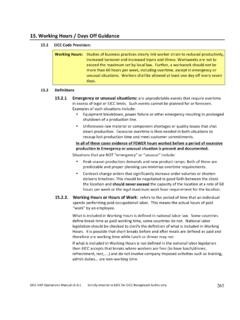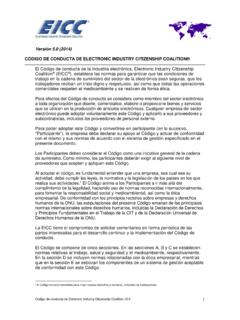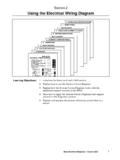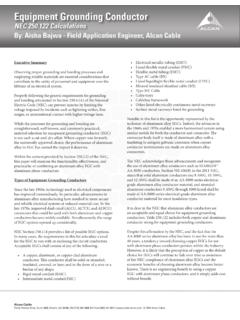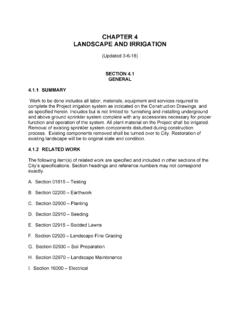Transcription of Version 4.0 (2012) - Responsible Business
1 Version (2012).. ELECTRONIC INDUSTRY CITIZENSHIP COALITION code OF CONDUCT.. The Electronic Industry Citizenship Coalition (EICC ) code of Conduct establishes standards to ensure that working conditions in the electronics industry supply chain are safe, that workers are treated with respect and dignity, and that Business operations are environmentally Responsible and conducted ethically. Considered as part of the electronics industry for purposes of this code are all organizations that may design, market, manufacture or provide goods and services that are used to produce electronic goods.
2 The code may be voluntarily adopted by any Business in the electronics sector and subsequently applied by that Business to its supply chain and subcontractors, including providers of contract labor. To adopt the code and become a participant ( Participant ), a Business shall declare its support for the code and actively pursue conformance to the code and its standards in accordance with a management system as herein. Participants must regard the code as a total supply chain initiative. At a minimum, Participants shall also require its next tier suppliers to acknowledge and implement the code .
3 Fundamental to adopting the code is the understanding that a Business , in all of its activities, must operate in full compliance with the laws, rules and regulations of the countries in which it 1. operates. The code encourages Participants to go beyond legal compliance, drawing upon internationally recognized standards, in order to advance social and environmental responsibility and Business ethics. The EICC is committed to obtaining regular input from stakeholders in the continued development and implementation of the code of Conduct. The code is made up of five sections.
4 Sections A, B, and C outline standards for Labor, Health and Safety, and the Environment, respectively. Section D adds standards relating to Business ethics; Section E outlines the elements of an acceptable system to manage conformity to this code . 1. The code is not intended to create new and additional third party rights, including for workers. EICC code of Conduct 1. A. LABOR. Participants are committed to uphold the human rights of workers, and to treat them with dignity and respect as understood by the international community. This applies to all workers including temporary, migrant, student, contract, direct employees, and any other type of worker.
5 The recognized standards, as set out in the annex, were used as references in preparing the code and may be a useful source of additional information. The labor standards are: 1) Freely Chosen Employment Forced, bonded (including debt bondage) or indentured labor, involuntary prison labor, slavery or trafficking of persons shall not to be used. This includes transporting, harboring, recruiting, transferring or receiving vulnerable persons by means of threat, force, coercion, abduction or fraud for the purpose of exploitation. All work must be voluntary and workers shall be free to leave work at any time or terminate their employment.
6 Workers must not be required to surrender any government-issued identification, passports, or work permits as a condition of employment. Excessive fees are unacceptable and all fees charged to workers must be disclosed. 2) Child Labor Avoidance Child labor is not to be used in any stage of manufacturing. The term child refers to any person under the age of 15 (or 14 where the law of the country permits), or under the age for completing compulsory education, or under the minimum age for employment in the country, whichever is greatest. The use of legitimate workplace apprenticeship programs, which comply with all laws and regulations, is supported.
7 Workers under the age of 18 shall not perform work that is likely to jeopardize the health or safety of young workers. 3) Working Hours Studies of Business practices clearly link worker strain to reduced productivity, increased turnover and increased injury and illness. Workweeks are not to exceed the maximum set by local law. Further, a workweek should not be more than 60 hours per week, including overtime, except in emergency or unusual situations. Workers shall be allowed at least one day off per seven-day week. 4) Wages and Benefits Compensation paid to workers shall comply with all applicable wage laws, including those relating to minimum wages, overtime hours and legally mandated benefits.
8 In compliance with local laws, workers shall be compensated for overtime at pay rates greater than regular hourly rates. Deductions from wages as a disciplinary measure shall not be permitted. The basis on which workers are being paid is to be provided in a timely manner via pay stub or similar documentation. 5) Humane Treatment There is to be no harsh and inhumane treatment including any sexual harassment, sexual abuse, corporal punishment, mental or physical coercion or verbal abuse of workers; nor is there to be the threat of any such treatment. Disciplinary policies and procedures in support of these requirements shall be clearly defined and communicated to workers.
9 EICC code of Conduct 2. A. LABOR (con't.). 6) Non-Discrimination Participants should be committed to a workforce free of harassment and unlawful discrimination. Companies shall not engage in discrimination based on race, color, age, gender, sexual orientation, ethnicity, disability, pregnancy, religion, political affiliation, union membership or marital status in hiring and employment practices such as promotions, rewards, and access to training. In addition, workers or potential workers should not be subjected to medical tests that could be used in a discriminatory way.
10 7) Freedom of Association Open communication and direct engagement between workers and management are the most effective ways to resolve workplace and compensation issues. The rights of workers to associate freely, join or not join labor unions, seek representation, and join workers'. councils in accordance with local laws shall be respected. Workers shall be able to openly communicate and share grievances with management regarding working conditions and management practices without fear of reprisal, intimidation or harassment. EICC code of Conduct 3. B. HEALTH and SAFETY.
